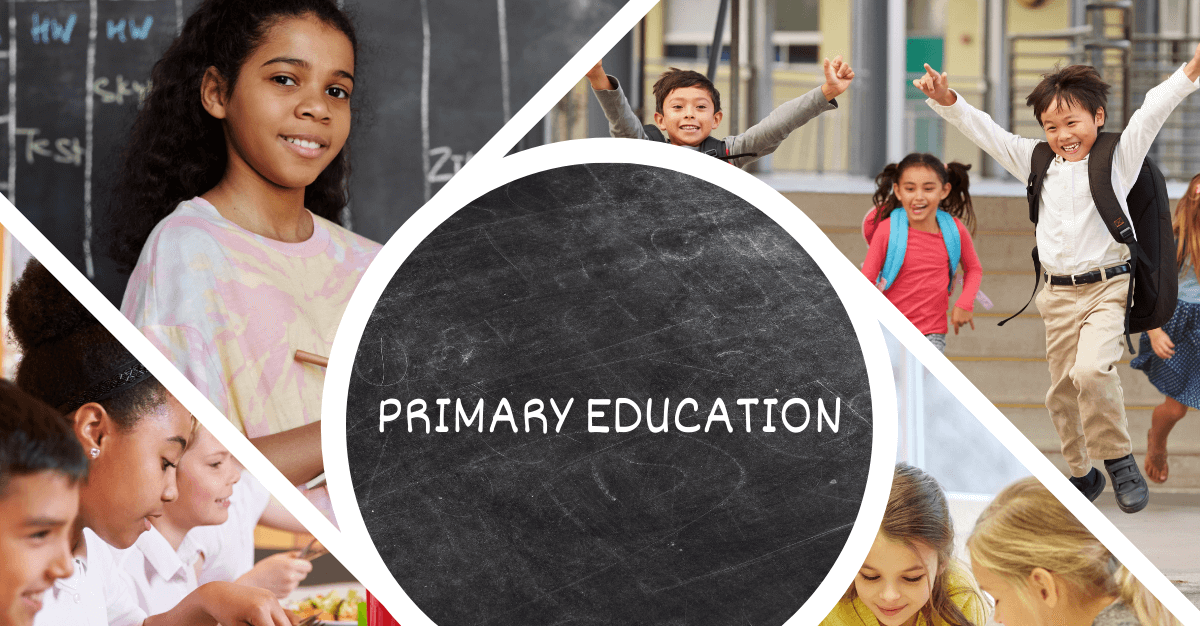
16 Oct Significance of Primary School Education in Your Child’s Development

Entering primary school is a significant milestone in your child’s academic journey. It signifies the transition from the playful environment of kindergarten to a more structured, knowledge-driven phase. During this crucial period, your child will need to adapt to a more disciplined routine, acquire new knowledge, and develop vital skills that form the foundation for their future success.
As a parent, it’s essential to understand the paramount importance of primary education. Recognising and actively supporting your child during this pivotal phase ensures they maximise this golden learning opportunity. This proactive involvement not only paves the way for their academic growth but also establishes the groundwork for their long-term development.
What do children learn from Primary school?
The primary education system focuses on developing strong foundational skills. Here are some key aspects of what children learn from Primary schools:
1. Mathematics: Primary education emphasizes problem-solving, critical thinking, and a deep understanding of mathematical concepts. Students learn various basic math topics, including arithmetic, algebra, geometry, and statistics.
2. Mother Tongue Languages: In a country where English is not a native language, in primary school, most students will learn a “Mother Tongue” language as a main subject in school. This subject will help children develop their expression skills and perfect their writing in their mother tongue language.
3. English Language: Because English has become a popular language globally, English is the medium of instruction in most primary schools. Primary students learn 4 skills in English: reading, writing, speaking, and listening. The curriculum includes grammar, vocabulary, comprehension, and creative writing.
4. Science: The science curriculum introduces students to topics such as biology, chemistry, and physics. They learn to conduct experiments, make observations, and understand scientific principles.
5. Social Studies: Social studies covers topics related to history, geography, culture, and society. Students gain an understanding of their country’s heritage and its place in the world.
6. Character and Citizenship Education (CCE): This subject instil values such as respect, responsibility, and integrity. Students learn about citizenship, social responsibility, and the importance of contributing to the community.
7. Physical Education (PE): PE classes promote physical fitness, sportsmanship, and teamwork. Students engage in various physical activities and sports to develop their motor skills and overall health.
8. Art and Music: The curriculum includes art and music lessons, fostering creativity and appreciation for the arts. Students explore different art forms and musical instruments.
9. 21st-Century Skills: Beyond academics, the curriculum also focuses on developing 21st-century skills, including communication, collaboration, digital literacy, and adaptability.
Children’s knowledge and skills requirements are increasingly improving. Elementary school children can approach many subjects that are quite new and difficult for them.
Each primary school will have a different schedule with the goal of helping children grasp basic knowledge, recognize each child’s talents, and orient in-depth training in higher levels of education. That’s why choosing the appropriate school is important to get faster development.

The Significance and Role of Primary Education in Your Child Development
Primary education performs a critical function in a child’s basic development. Here are some of the key significance and roles of primary education in a child’s development:
1. Foundation for Learning:
With the nature of a child’s fast-learning brain in the first ten years of life, primary education provides the foundational knowledge and skills children need for future learning. It introduces fundamental subjects that can stay with children for the rest of their lives.
Through many subjects and activities at school, primary education allows children to discover their interests and develop a love for learning.
2. Academic Skills:
As children progress from kindergarten to primary school, their focus shifts from socializing and play-based learning to more structured academic skills development. In primary education, students dedicate more time and effort towards honing their academic skills, including reading, writing, and math, which form the foundation of their educational journey.
3. Cognitive Development:
Primary education stimulates cognitive development by encouraging critical thinking, problem-solving, and creativity. Children learn to analyze information, connect, and apply knowledge to real-world situations.
4. Social and Emotional Development:
School is not just about academics; it’s also a place for social and emotional growth. Children learn to interact with each other and develop friendships. They also gain a sense of independence and responsibility.
Children improve their communication skills through classroom activities, presentations, and interactions with teachers and peers.
5. Character Development:
Primary education often emphasizes character development by teaching honesty, respect, empathy, and responsibility. These values contribute to a child’s moral and ethical development.
6. Cultural Awareness:
Primary education exposes children to diverse cultures, perspectives, and ideas. This stage of education also fosters cultural awareness and promotes tolerance and understanding.
7. Preparation for the Future:
Primary education is the foundation for academic and career success. It provides children with the skills and knowledge needed for higher education or vocational training.
By building a strong foundation, primary education helps children develop critical thinking, problem-solving, and analytical reasoning skills, which are essential for success in any field.

Conclusion
For any breakthrough development, the platform always plays a key role.
Primary education is a vital period for the growth and development of the brain, cognitive skills, and social skills. It is essential for parents to invest in quality primary education to ensure a strong foundation for their child’s future success and personal growth. A good primary education sets the stage for a child’s life-long learning and opens up opportunities for them in the future.


